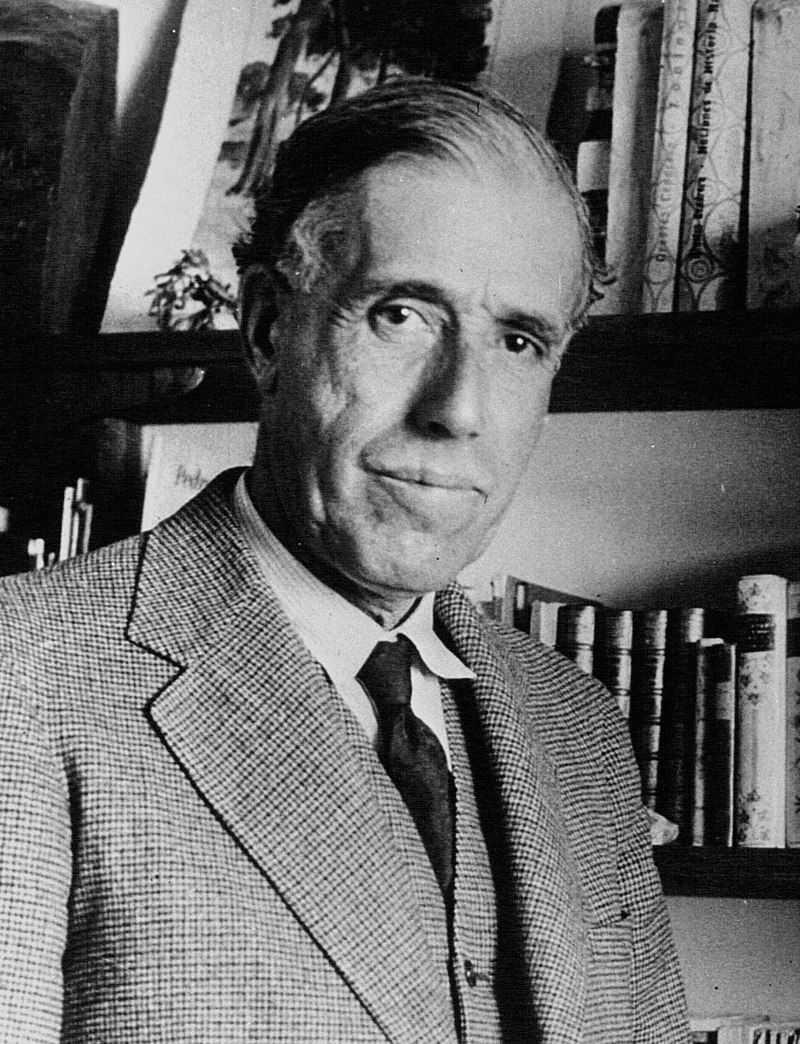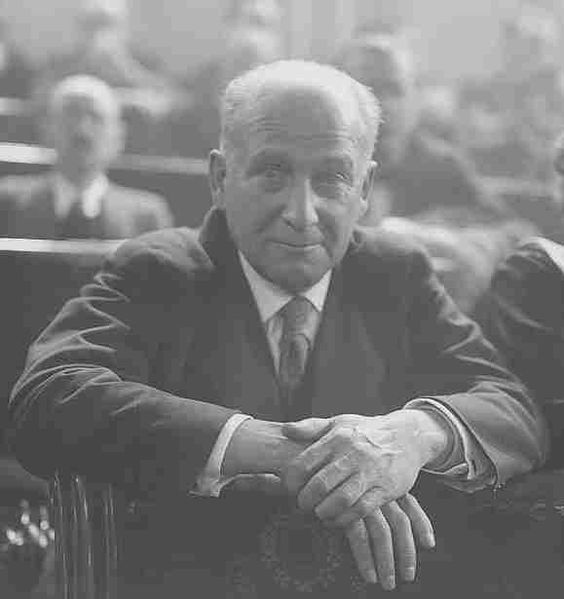<Back to Index>
- Member of the Spanish Socialist Workers' Party Julián Besteiro Fernández, 1870
- 66th Prime Minister of Spain Francisco Largo Caballero, 1869
PAGE SPONSOR

Julián Besteiro Fernández (September 21, 1870 - September 27, 1940) was a Spanish socialist politician and university professor.
Born in Madrid, he was educated in the Institución Libre de Enseñanza, and studied in the Faculty of Philosophy and Letters at the University of Madrid, as well as at the Sorbonne in 1896, the Universities of Munich, Berlin and Leipzig in 1909 - 1910. In 1908, he joined the Partido Radical (Radical Party) established by Alejandro Lerroux.
He became a member of the Agrupación Socialista Madrileña (the socialist circle in Madrid) in 1912 and in that same year he was offered the Chair of Fundamental Logic in the Faculty of Philosophy and Letters. Soon after, Besteiro became a member of Unión General de Trabajadores (UGT) trade union and of the Spanish Socialist Workers' Party (PSOE). In 1913 he married Dolores Cebrián, a professor of physics and natural science at the teachers' training college in Toledo.
In 1917, after the general strike of that year he was tried as a member of the strike committee and sentenced to life imprisonment. He was elected as a member of the town council of Madrid in the amnesty campaign. In the following year, he was elected to the Cortes Generales (Spanish Parliament) as deputy for Madrid.
During
the dictatorship of Miguel
Primo de Rivera he was in favor of collaboration
with the Dictator - who had offered the participation of
UGT in governing the country. To a certain extent, it
appeared to be a success in the mid 1920s. However,
opinion within the PSOE turned against him as the Primo de
Rivera regime became even more unpopular in the economic
downturn. In mid 1930s Besteiro became isolated in his
opinions on collaboration in opposition to the front
established by the Pact of San Sebastián.
Bestiero also opposed the participation of UGT in the
December 15, 1930 general strike. At a joint meeting of
the PSOE and UGT he resigned as President of both the
party and the union in February 1931. In the same year he
was elected a councilor of the Madrid town council.
After the establishment of the Second Spanish Republic, Besteiro was elected Speaker of the Constituent Cortes. During his period as President of the Cortes, he seemed to become more conservative in his political views. He resigned as President of the UGT in January 1934. Opposing the growing radicalization of the Socialist movement, he disapproved the participation of various socialists in the armed uprising of October 1934. In February 1936, he won the highest number of votes of any candidate in Madrid in the Popular Front elections.
When the Spanish Civil War broke out Besteiro continued to work in the university as a Dean of the Faculty of Philosophy and Letters and carry out his duties as a parliamentary deputy and councilor of the town council in Madrid. Against the persuasions of his friends he refused to leave Madrid and seek exile. Manuel Azaña, the Spanish Republican President, chose Besteiro as the representative to the coronation of the new British King George VI in London on May 12, 1937. Besteiro believed it was to be a peace mission. There he met with Sir Anthony Eden but no significant results followed. After the failure of his mission in London he returned to work in the town council of Madrid and withdraw from official public life. He stopped attending the Agrupación Socialista Madrileña and the parliamentary group meetings.
With the news of the fall of Barcelona on January 26,
1939, and Azaña's resignation as President of the
Republic, Besteiro decided to find ways to achieve peace
and stop the resistance. He contacted Colonel Segismundo
Casado and, on March 5, announced the creation of a Consejo
Nacional de Defensa. As a result, about
2,000 people were killed in the uprising against the
government of Juan Negrín and its Communist Party of Spain
allies.
After the fall of Madrid to the Nationalists on March 28,
1939, Bestiero was arrested by Francoist
forces. On July 8, he faced a court
martial and was sentenced to thirty years.
He was sent first to the Monasterio de
Dueñas until the end of August 1939 and then to
the prison of Carmona,
where he died the following year.


Francisco Largo Caballero (15 October 1869 - 23 March 1946) was a Spanish politician and trade unionist. He was one of the historic leaders of the Spanish Socialist Workers' Party (PSOE) and of the Workers' General Union (UGT). During 1936 and 1937, Largo Caballero served as the Prime Minister of the Second Spanish Republic.
Born in Madrid, as a young man he made his living stuccoing walls. He participated in a construction workers strike in 1890 and joined the PSOE in 1894. Upon the death in 1925 of party founder Pablo Iglesias, he succeeded him as head of the party and of the UGT.
Moderate in his positions at the beginning of his political life, he advocated maintaining a degree of UGT cooperation with the dictatorial government of General Miguel Primo de Rivera, which permitted the union to continue functioning under his military dictatorship (that lasted from 1923 to 1930). This was the start of his political conflict with Indalecio Prieto, who opposed all collaboration with the dictatorial regime.
He was Minister of Labor Relations between 1931 and 1933, in the first governments of the Second Spanish Republic, headed by Niceto Alcalá - Zamora, and in that of his successor Manuel Azaña. He enjoyed great popularity among the masses of workers, who saw their own austere existences reflected in his way of life.
In the elections of 19 November 1933, the right wing Spanish Confederation of the Autonomous Right (CEDA) won power in Spain. The government nominally led by the centrist Radical Alejandro Lerroux was dependent on CEDA's parliamentary support. Responding to this reversal of fortune, Largo abandoned his moderate positions, began to talk of "socialist revolution", and became the leader of the left (Marxist and revolutionary) wing of the UGT and the PSOE. In early October 1934, after three CEDA ministers entered the government, he was one of the leaders of the failed armed rising of workers (mainly in Asturias) which was forcefully put down by the CEDA - dominated government.
He defended the pact of alliance with the other workers' political parties and trade unions, such as the Communist Party of Spain (PCE) and the anarchist trade union, the Confederacion Nacional del Trabajo (CNT). Once again, this placed him at odds with Prieto. He declared, that he, Largo Caballero "shall be the second Lenin", whose aim is the union of Iberian Soviet republics.
After the Popular Front won the elections in February 1936, president Manuel Azaña proposed that Prieto join the government, but Largo blocked these attempts at collaboration between PSOE and the Republican government. Largo dismissed fears of a military coup, and predicted that, were it to happen, a general strike would defeat it, opening the door to the workers' revolution.
In the event, the coup attempt by the colonial army and the right came on 17 July 1936. While not immediately successful, further actions by rebellious army units sparked the Spanish Civil War (1936 - 1939), in which the republic was ultimately defeated and destroyed.
On 4 September 1936, a few months into the civil war, he
was designated the 134th Prime Minister and Minister of
War.
Besides conducting the war, he also focused on maintaining
military discipline and government authority within the
Republic. Nonetheless, the Barcelona May Days led to a
governmental crisis that forced Caballero to resign on 17
May 1937. Juan Negrín, also a member of the PSOE, was
appointed Prime Minister in his stead.
Upon the defeat of the Republic in 1939, he fled to France. Arrested during the German occupation of France, he spent most of World War II imprisoned in the Sachsenhausen - Oranienburg concentration camp, until the liberation of the camps at the end of the war.
He died in exile in Paris in 1946; his remains were returned to Madrid in 1978.
His son, Francisco Largo Calvo, was imprisoned by the Francoists at the start of the Spanish Civil War and spent the entire war behind bars under the threat of execution. Largo Calvo fled Spain to Mexico in 1949 where he resided until his death in 2001.